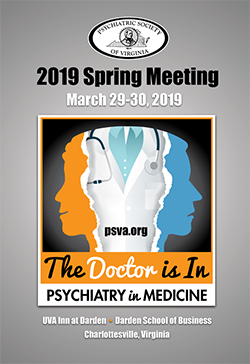Winter 2018 Issue |
|
2018 PSV Fall Meeting Recap
Ageism in Mental Healthcare
Kirsten M. Wilkins, MD
Dr. Wilkins presented on the prevalence and impact of ageism in mental healthcare. She began with the definition and origin of the term ageism and discussed the many ways ageism presents in society at large, including "benevolent" ageism, "elderspeak" and media campaigns. She then discussed the impact of ageism on patients, caregivers, healthcare providers, medical education, and the healthcare system. Lastly, strategies for combating ageism in healthcare were suggested, and the audience was encouraged to consider ways they can work toward combating ageism in their work settings.
Special "T" Training: Providing Competent and Affirming Psychiatric Care to Transgender Individuals
Jeremy Kidd, MD, MPH
Dr. Jeremy Kidd provided an overview of transgender mental health, including strategies by which psychiatrists can provide gender-affirming treatment in the general psychiatric setting. Gender identity is one’s internal sense of being a man, woman, or another gender. This is different from sex, a biological construct defined on an anatomic, hormonal, or genetic basis. Transgender people have a gender identity that is different from the sex that they were assigned at birth (e.g., male or female). Transgender people are part of every social group, race/ethnicity, religious community and nationality. Transgender individuals face numerous health disparities including higher rates of anxiety disorders, depressive disorder, suicidality and substance use. These health disparities are due in-part to minority stress, a type of stress experienced by individuals from marginalized groups that is additive to general stress and derived from discrimination, societal stigma and internalized prejudice. This discrimination includes healthcare discrimination which is associated with healthcare avoidance and worse health outcomes. Providers can create a gender-affirming environment by asking every patient about their gender identity rather than making assumptions. This includes asking patients (in-person and/or on forms) their preferred name and the pronoun they use (e.g., he, she, they). These small steps go a long way in establishing rapport and communicating respect. More information on transgender health can be found at the World Professional Association for Transgender Health and in the APA’s Guide for Working with Transgender and Gender Nonconforming Patients.
First Place Poster Winner:
Anti-NMDA Receptor Encephalitis: A Pediatric Case that Highlights Challenges in Management and the Role of Psychiatry
Divya Gongireddy, MD
Anti-NMDA Receptor Encephalitis is a type of autoimmune encephalitis caused by antibodies targeting the NMDA receptor. It is a relatively new diagnosis, having only been formally described and characterized in 2007. Its clinical features can be divided into three stages of disease progression: prodromal period of viral-like illness, prominent psychiatric and behavioral changes and neurologic complications like alterations in awareness and dyskinesias. This case is about an adolescent female who initially presented to the ED with behavioral changes and signs of florid psychosis. She received a basic medical workup in the ED, but was eventually admitted to the inpatient psychiatric floor due to suspected mania or psychosis. She had a difficult clinical course, partly related to a delay in proper diagnosis. Treating this patient required a multidisciplinary approach due to complicated picture of medical illness and behavioral/emotional disturbance. This case also illustrates some of the challenges associated with managing patients who have serious medical problems along with psychiatric symptoms, such as deciding what type of unit these patients should be hospitalized on, and what role psychiatry should play.
Ideally, patients with encephalitis should probably still be placed on a medical floor due to certain features of this disorder like seizures and autonomic instability. No matter where a patient eventually is placed, it will be very important for each of the various disciplines to collaborate on a plan of care. These patients will likely need constant supervision, secure environments, physical/chemical restraints and input from subspecialty consultation services.
It is also important to discuss the role in psychiatry in managing acute and chronic phases of this disease. Due to the symptomatology, 75% of patients first present to a psychiatrist, so it is important that psychiatrists consider anti NMDA receptor encephalitis as a differential diagnosis. In the acute phase of the illness, psychiatrists will be responsible for managing psychotropic medications, providing consultation and psychoeducation to other providers about delirium and other psychiatric illnesses, and facilitating communication between the different treatment teams. Psychiatric and neurocognitive dysfunction can persist for months to years following the acute phase of illness, so in the long term, psychiatrists will need to provide ongoing medication management and support.
Second Place Poster Winner:
Corticosteroid-Induced Catatonia Summary
Ryan Wade, MD
The presentation depicted a case of a 45-year-old female who was admitted to the hospital for evaluation of chest pain and shortness of breath who was later found to have dermatomyositis. In the course of treating dermatomyositis, the patient received methylprednisolone and subsequently developed an alteration in her mental status. After psychiatric consultation and a lorazepam challenge, it was determined that the patient had developed catatonia. The case is novel given there is a poverty of published literature regarding corticosteroid-induced catatonia, despite the well-known potential for corticosteroids (particularly in doses above 80 mg prednisone-equivalent) to induce psychiatric symptoms. Additionally, there are several dangerous medical sequelae that can arise from untreated catatonia, with this case serving as a reminder for clinicians outside of the field of psychiatry that catatonia can develop outside of the context of mental illness. Furthermore, recognition of the proper diagnosis allowed for treatment of the altered mental status and the patient’s corticosteroid treatment was allowed to continue uninterrupted, ultimately improving her medical care.
YOUR NEWSLETTER IS NOW AVAILABLE ON YOUR SMARTPHONE AND TABLET!
JOIN PSV TODAY!
PLAN NOW!
PSV 2019
SPRING MEETING
March 29-30
UVA Inn at Darden
Darden School of Business
Charlottesville, VA
APA Find a Psychiatrist
Are you accepting new patients?
Opt into APA’s “Find A Psychiatrist” database. To view the functionality or opt-in, CLICK HERE
FYI: A link for this option has been added to the PSV website. Select the “About” button and then “Find a Psychiatrist” from the drop down.





